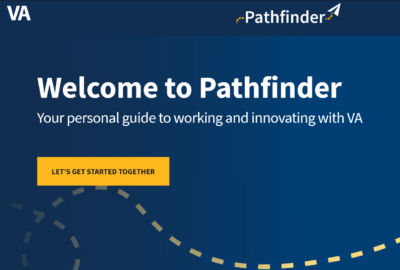
Hubbard Radio Washington DC, LLC. All rights reserved. This website is not intended for users located within the European Economic Area.
Hubbard Radio Washington DC, LLC. All rights reserved. This website is not intended for users located within the European Economic Area.
Exactly who is responsible for labor law enforcement when it comes to federal contractors? The short answer the Office of Federal Contract Compliance Programs, ...
Best listening experience is on Chrome, Firefox or Safari. Subscribe to Federal Drive’s daily audio interviews on Apple Podcasts or PodcastOne.
Exactly who is responsible for labor law enforcement when it comes to federal contractors? The short answer the Office of Federal Contract Compliance Programs, part of the Labor Department. But that’s not the full answer. An Federal Acquisition rule that was banned by Congress is rearing its ugly head agency-by-agency. The Federal Drive with Tom Temin got the latest from the president and CEO of the Professional Services Council, David Berteau.
Interview transcript:
Tom Temin: David, tell us more about this rule that is somehow like a zombie. And you see its bony hand popping out of the grave here?
David Berteau: Well, Tom, as you know, in the government, no idea is ever really fully resolved, it can always come back again. And we see that happening now with something that goes all the way back to the Obama administration, there was an executive order called the very, very nice title of Fair Pay and Safe Workplaces. Well, who’s opposed to that? Right. But the implementation of it through the Federal Acquisition Regulation was that an allegation of a labor law violation could lead a contractor to be essentially be blacklisted, that is not eligible to receive a contract. That’s an allegation. That’s not a conviction. That’s not a prosecution. There’s not even an admission of guilt in a settlement, right. And so this was put forth in the Federal Acquisition Regulation. It was enjoined, its enforcement was enjoined by a federal district court in 2015, or 2016. And then in early 2017, Congress through the Congressional Review Act, removed it from force, in other words, eliminated the regulation itself. That was five years ago. Now, what we saw creep in earlier this year in the Agriculture Acquisition Regulation, even though you have very dedicated listeners is probably not a lot of them that read the AGAR in the Federal Register. Notice that when it comes out in this was buried in a bunch of technical amendments, but it was a resurrection of the basic idea. With the Agriculture Department being in charge of labor law violation, we have indications from some of the watchers of the system that other agencies are contemplating similar rules. Now, PSC commented on this, on this draft that the AGAR
Tom Temin: Right. Because the rules of federal procurement, which have a basis in statute are designed to be fair to everybody. And you can’t do things on the basis of negative actions on allegations unless they’re proven basically.
David Berteau: That’s correct. And that’s the way it should be. It’s the nature of law in America. And it is a rule of law in the federal procurement process. It’s what we ought to continue to do.
Tom Temin: How did this come to light, you said it was buried in a bunch of technical amendments. So somebody was reading the AGAR?
David Berteau: Well, one of the benefits that PSC brings to our members is we cover all federal agencies. And so we’re not just looking at the Federal Acquisition Regulation of the Defense Supplement the DEFARS that often comes into play. But we’re watching everything and our members are watching everything. And so they only had 30 days to respond. We filed the request for an extension did not get it, or didn’t hear anything back on the request for an extension and filed the comments. And we’re prepared to do that again. So it’s because we cover all the federal agencies and all the little nits and noise of the Federal Acquisition Regulations flowing down through those agencies.
Tom Temin: It’s a wonder they even bothered to make a notice at all. That sounds a little high handed.
David Berteau: Well, you certainly have to wonder, what’s the intention here, right, did some GS-15 in the Agriculture Department wake up one morning and say we’d like to run federal labor law for contractors. I kind of doubt it. But I don’t know what the plan is. I believe that one possibility is that the Congressional Review Act abandonment of this process might be seen as only applying if it’s done at the FAR level at the OMB Office of Federal Procurement Policy level on the FAR Council level, that if each agency does it in its own regulations, it would not be subject to the CRA. That’s not our view of that. But there’s not a lot of history on Congressional Review Act actions over time.
Tom Temin: We’re speaking with David Berteau. He is president and CEO of the Professional Services Council. And another subject I wanted to ask you about here. That is the Special Inspector General for Afghanistan Reconstructions’ latest report. There were some elements in that that didn’t quite sit right with contractors.
David Berteau: Well, you remember it’s a year ago now that the president announced that we were withdrawing all our forces from Afghanistan and they started the process. I don’t need to recount the history of the fall of Kabul and the emergency evacuation of well over 100,000 people out of Hamid Karzai International Airport last August. But the SIGAR issued his interim report on the collapse on how fast the collapse went. And both the report itself and a number of former military officers who had commanded in Afghanistan made comments that somehow the contractors pulled out. And that that led to the collapse. Well, there’s no question but that the contractor support necessary for the Afghan National Security Forces is something that was, that they missed as soon as it was diminishing. But it’s also true that most of those contractors were following the guidance or the request from the federal government with whom they contracted. There’s nobody that I know of that made actions on their own. In fact, in many cases, one agency in particular, which I won’t name on the program to protect the companies, and the Afghans still inside Afghanistan. Their contracts were continued even after the fall of Kabul, even after the evacuation ended. So to blame any of this on contractors, it seems to me to be both misleading and unhelpful going forward, particularly since we’ve got another war still going on.
Tom Temin: Right there is language in the introduction to that report that says that the military, the U.S. military, withdrew contractor support fairly early before the collapse. So I mean, there’s that.
David Berteau: In many cases, the contract itself required the U.S. military or the U.S. government to provide the security. And so once that security is gone, the contractors are kind of in a bit of a pickle. And many of them had to begin to operate in a way that probably protected their workers and their work, as well as got the job done. It was a mess. And there’s a lot of lessons to be learned from that the SIGAR report doesn’t really give you the right lessons, I’m afraid.
One of the things we know is that the military, both our military and other militaries need contractor support in everything from technical services to day to day operations. And it actually is better for the government to use military for those things that only the military can do. And to use contractors went to support those so that the military that are both your most expensive workers, and in many ways, your best trained and most capable workers for their missions, are able to focus on their missions, not on the nits and gnats behind it.
Tom Temin: And just quickly, I wanted to ask you about a new bill concerning organizational conflicts of interest that had been marked up by the Senate Homeland Security and Governmental Affairs Committee, and it seems to concern a single company?
David Berteau: Well, there’s certainly a long standing set of rules regarding organizational conflict of interest and the Federal Acquisition Regulation and its various supplements have a lot of implementation language associated with that. But there’s also a lot of authority left up to individual contracting officers and programs on how to manage that going forward. You want that, that flexibility to be there. So the government can meet its needs. This particular case, this bill was generated through a series of hearings and reports in both the House in the Senate on one company, which was doing business with private sector companies. And with an agency at the same time, the agency was the Food and Drug Administration, the private sector companies was a drug manufacturer. And at least there was the potential in the appearance of individuals who are working for both sides of that over a relatively long period of time, eight or nine years, whether or not any actual conflict occurred still remains to be determined, in my view, but the bill will in fact, require additional acquisition regulations to keep this sort of thing from happening. The bill itself doesn’t actually create that language that’s going to have to be done through the Federal Acquisition Regulation and the FAR Council.
Tom Temin: Well, maybe you can get something into that bill to bar what Agriculture is doing with its regulations.
David Berteau: Well, one of the things it’s useful to recognize, Tom, even though it’s only you know, the first of June, Congress and the Senate don’t have a whole lot of legislative days left. When this Congress reaches its end in December, it’ll go out of business and the new Congress will take effect as voted on in the midterms. Without a lot of legislative days. That means not a lot of legislative vehicle, so we have to watch each bill very, very carefully.
Tom Temin: David Berteau is President and CEO of the Professional Services Council. As always, thanks so much.
David Berteau: You’re welcome, Tom. Look forward to the next one.
Copyright © 2024 Federal News Network. All rights reserved. This website is not intended for users located within the European Economic Area.
Tom Temin is host of the Federal Drive and has been providing insight on federal technology and management issues for more than 30 years.
Follow @tteminWFED


